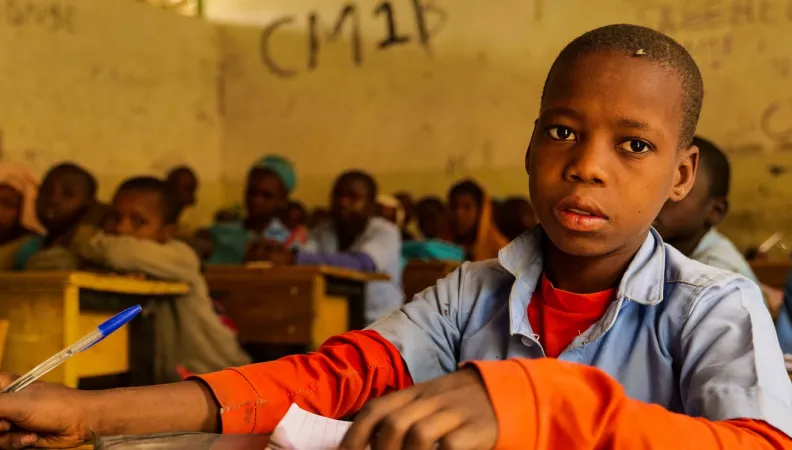Share the page
School Canteens: Part of “the Biggest Social Protection Plan in the World”
Published on

The first global meeting of the School Meals Coalition took place this week, as part of an urgent effort to improve school canteens and expand children’s access to regular, healthy meals. And as we find out in this interview with AFD experts in education, agriculture and development, the initiative is about far more than food.
Launched in 2021 by the UN World Food Program, with the support of France and Finland, the School Meals Coalition aims to ensure every child in need gets a regular healthy meal in school by 2030.
Veronika Chabrol is Deputy Director of AFD’s Education Division, and Sandra Rulliere is Deputy Director of the Agriculture, Rural Development and Biodiversity Division.
What are free school meals all about?
Veronika Chabrol: Around the world today, 153 million children and young people are food insecure, meaning they don’t have regular access to sufficient, healthy and nutritious food. This situation obviously poses a threat to both the health of children and their ability to learn. School feeding contributes to children’s health by offering diversified and healthy food, and to their education by meeting the nutritional requirements for their proper development. In situations of crisis or great vulnerability, a free school meal provides a strong incentive for the poorest parents to send their children to school, especially their daughters.
Sandra Rulliere: School feeding also provides market and income opportunities for family farms in rural areas. So, it can help diversify agricultural production in territories and promote local processing. This can also contribute to employment opportunities.
In addition, while food systems account for over a third of global greenhouse gas emissions, school feeding can play a role in the prevention of agricultural losses and food waste, thereby reducing emissions. School feeding contributes to creating more resilient and inclusive rural areas.
Further reading: Working towards Food Security in West Africa: 5 AFD Group Projects
What is the situation in terms of school feeding around the world today?
V.C.: The State of School Feeding Worldwide 2022 report of the UN World Food Program (WFP) clearly shows free school feeding is the biggest social protection plan in the world, as 418 million children benefited from it in 2022. This figure represents 41% of the primary-school-age population. And 87% of countries today have a national school feeding policy.
However, these figures hide significant disparities: 61% of schoolchildren in high-income countries benefit from free or subsidized school meals, but only 18% in low-income countries.
What are the barriers to setting up school canteens?
V.C.: There can be many barriers. Firstly, budgetary barriers, especially in a number of low-income countries where it’s difficult to bear the cost of this major spending item when the education budget itself isn’t sufficient to build schools or pay teachers. So, these food programs remain highly dependent on external financing, which is time-limited and deployed in insufficient quantities.
They also face major organizational and logistical issues, such as the implementation of regular health quality controls, the existence of effective procurement, storage and delivery chains, and the skills required for financial management and audit. This issue is also beyond the scope of a Ministry of Education, andrequires an inter-ministerial and multi-stakeholder approach, involving actors from the education, health and agriculture sectors, local administrations, and parents’ associations. Strong political will is required, if possible from authorities at the highest level.
Further reading: Transforming Education: AFD Group has Solutions in its Satchel
What is AFD Group’s approach to financing school feeding?
V.C.: Our objective is to help countries build their financing capacities and their own operational capacities, so that they can handle school feeding on a sustainable and autonomous basis. Investing in balanced and regular school meals means reducing some of the public expenditure for healthcare in the future, and building the economy of tomorrow.
We focus on a comprehensive approach to development, in connection with the introduction of public policies promoting the strong link between the implementation of school feeding programs and the development of job-creating and income-generating agricultural sectors in territories to supply the food. We work closely with the Global Partnership for Education (GPE), the only fund dedicated exclusively to financing basic, primary and secondary education.
One of the best examples of this approach can be seen in Senegal, where the Senegalese Government has launched a national school canteen program targeting rural areas and deprived suburban areas. As a partner of GPE in this country, AFD is supporting the implementation of the Memorandum of Understanding signed between the Ministry of Education and the World Food Program (WFP) for the creation of canteens in 637 schools located in regions facing high levels of food insecurity. Between 2020 and 2022, this project enabled more than 100,000 vulnerable students to return to school after the Covid-19 crisis, which had led to the closure of schools. This project focuses on short supply chains and the canteens are primarily supplied by local operators.
Further reading: Setting up School Canteens to Stop Kids from Dropping Out
In Burundi, AFD is currently financing a school feeding program, again in partnership with GPE and WFP. This program is providing 100,000 children in Muyinga province with regular meals. In Lebanon, AFD’s financing, in partnership with the CSO International Orthodox Christian Charities, has provided regular meals to 6,500 public school students. It has also supported 12 local companies by sourcing local products certified ISO 22000.
